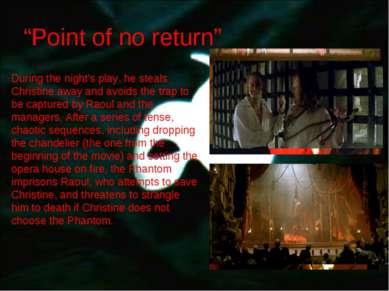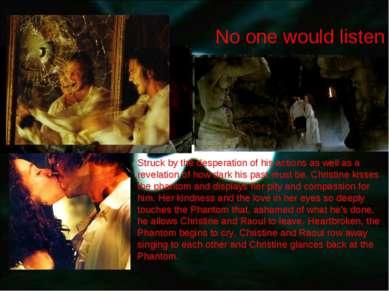Конспект урока английского языка в 10 классе.
Тема урока «Жизнь и творчество Гастона Леру. Призрак оперы»
Орг. Момент
Listen to the music. What images come to mind? How is the music related to the picture and title of the text you have got?
Today we are talking about Gasto Leroux, his life and the musical version of “The Phantom of the Opera”.
Look on the blackboard. You can see some new words here. Let`s read and try to translate them.
(feuilletonist, criminally insane, recluse, to haunt, to abduct, to inherit, film adaptation, malediction, dilapidated, auction, coveted, to spot, to distract, chandelier, decay, disfigured, to plot, to resort, to stalk, sword fight, to strangle)
Now let us listen to the biography of Gaston Leroux.
Gaston Leroux was born in Paris, the son of a wealthy storeowner. He attended school in Normandy and studied law in Paris, receiving his degree in 1889. After inheriting nearly a million francs, he spent most of his time drinking and gambling. Finding his money gone, Leroux started to work as a theater critic and reporter for L'Écho de Paris. By 1890 Leroux had become a full-time journalist. Between the years 1894 and 1906 he travelled in different countries in Europe, Africa, and Asia as a correspondent. Leroux wrote for the daily newspaper Le Matin and L'echo de Paris and reported amongst other things about the Russian Revolution of 1905. From 1909 Leroux devoted himself entirely to writing, focusing on plays and popular novels of mystery and detection. In 919 Leroux established his own film company called Cinéromans. Leroux died in Nice on April 15/16, 1927, as a result of an acute urinary infection.
French mystery novelist, playwright, journalist, and a prolific feuilletonist. Leroux is best known for his Le Fantôme de l'opéra (1910, The Phantom of the Opera), in which a criminally insane recluse haunts a Paris opera house, and abducts a young and beautiful singer to his cellar retreat. The novel has been a source for several films and stage adaptations, including Andrew Lloyd Webber's musical version, first produced in 1987.
Leroux started to write novels in the early 1900s. Between the years 1903 and 1927 he produced two dozen newspaper serials, many shorter works and seven plays. In the UK and the USA Leroux's reputation was long based on his mysteries. His breakthrough work was Le Mystère de la chambre jaune (1907, The Mystery of the Yellow Room), which introduced the teenager crime reporter Joseph Josephson aka Rouletabille, a young journalist with a bullet-shaped head (hence his name). Its plot included one of the first "locked room" murder motifs. Mademoiselle Stangerson is found in The Yellow Room, lying on the floor in the agonies of death. She has cried "Murder! - murder! - help!" The room is sealed from the inside with a key and bolt, and the blinds on the only window are also fastened on the inside. Rouletabille's friend, Sinclair, chronicles the story, and serves as Rouletabille's own Dr. Watson. The official detective in the case, the least suspected person, is in fact a notorious criminal, who becomes the hero's arch-enemy - later a much used bluff. Le Parfum de la Dame en Noir (1909), the sequel to Le Mystère... also gained popularity, but Le Fantôme de l'opéra, produced from the author's fascination with the Paris Opera House, which really is set above a network of catacombs, was at first only a moderate success.
Later the character of Rouletabille inspired several films.
Leroux's narrative was fast moving, and he often used complicated plots. In his youth he wrote stories inspired by Alexandre Dumas and Victor Hugo. Later mature work show the influence of Jules Verne and Edgar Allan Poe, especially 'The Masque of the Red Death' (1842) in The Phantom... and the tale 'Thou Art the Man,' in which the detective turns out to be the murderer - the idea appeared again in The Mystery of the Yellow Room. In the novella The Burgled Heart (tr. 1925) Leroux employed supernatural elements - the astral body of a French woman is abducted by an English artist. The Kiss that Killed (tr. 1934) and The Machine to Kill (tr. 1935) featured a vampire and a robot as murderers.
The history of “The Phantom of the Opera”
Although The Phantom of the Opera is a version of the classic tale 'Beauty and the Beast', the fatal obsession is now music. "Erik was born in a small town not far from Rouen. He was the son of a master mason. He ran away at an early age from his father's house, where his ugliness was a subject of horror and terror to his parents." After years of wandering, Erik hides himself in the corridors and underground locales of the Paris Opera House. He has helped in the reconstruction of its cellars, and incorporated many trapdoors in the building. He falls in love with a young singer, Christiane Daaé, and arranges a series of deaths to advance her career. Raoul, Vicomte de Chagny, is also in love with Christine, but she is forbidden by Erik to respond to his advances. When the Opera managers refuse to make her a star, the unmasking of Erik's evil side leads to his destruction. "'Know,' he shouted, while his throat throbbed and panted like furnace, 'know that I am built up of death from head to foot and that this is a corpse that loves you and adores you and will never, never leave you!..."
The plot is presented as a story pieced together from interviews, revealing the "true" history of the Opera Ghost. In the classic film version from 1925 Lon Chaney was the victim of torture with a crazed mind. Chaney is a composer himself and in his obsession with Mary Philbin, a lovely singer, he drives away the opera's star so that Philbin can have the lead in Faust. Philbin is twice abducted by the Phantom to his secret world. The great moment of the film is when the Phantom is unmasked while playing the organ. As a result of a misfired publicity stunt, the film was banned in Britain for four years. In 1930 a talkie was issued, with some new footage and dialogue which had been recorded by the surviving actors. Arthur Lubin paid a great deal of attention to music in 1943 in his remake - Nelson Eddy, Susanna Foster and Jane Farrar had singing roles. The Phantom of the Paradise (1974) was Brian de Palma's horror comedy-drama about a disfigured musician haunting a contemporary pop palace. The film was poorly received by many critics but attained a large cult following. Susan Kay's novel Phantom (1990) was based on Leroux's work and won the Romantic Novel of the Year Award; Terry Prachett also played with Leroux's ideas in his Maskerade (1995).
The Phantom of the Opera

1 слайд
The Phantom of the Opera Let the fantasy begin © film adaptation of Andrew Lloyd Webber's 1986 musical of the same name Sometimes the beauty means safety and sometimes malediction

2 слайд
The opening scenes The film begins in 1919, where the dilapidated Paris Opera house holds an auction in selling pieces. Raoul the Vicomte de Chagny , now an old wheelchair-bound man, purchases a coveted music box. During the auction, Raoul spots a familiar figure: Madame Giry, whom he met as a young man. Madame Giry is now an old woman, almost 50 years later.

3 слайд
But he is distracted for the next piece, a broken chandelier now restored and electrically wired known as Lot 666. As the auctioneers display the restored chandelier, the opening crescendo of music wipes away the years of decay from the opera house as the black and white turns into color, and the audience is transported back in time to 1864, the beginning of the story, when the opera was in its prime.

4 слайд
Angel of music A disfigured musical genius called "The Phantom,"lives within the deepest recess of the opera house. Tormented by his scarred face due to his memories of being abused as a child, the Phantom lives in the watery labyrinths beneath the Opéra Populaire in Paris. After nearly ten years of quiet obsession with the delicate, ethereal voice of Christine Daaé and the beautiful young soprano herself, he plots to place his protégé at center stage.

5 слайд
“All I ask of you” Christine is caught between her love for Raoul, her childhood sweetheart who has returned into her life, and her fascination and pity for the Phantom. Jealous and possessive, the Phantom plots to make Christine his, resorting to stalking her wherever she goes as well as killing several people including leading man Piangi.

6 слайд
“Now, let it be the war upon you both” A swordfight later ensues in the cemetery, where Raoul eventually disarms him and is about to kill him when Christine pleads for him not to, "not like this." His rage seemingly augmented, the Phantom angrily states as Christine and Raoul walk away: "Now, let it be war upon you both."

7 слайд
“Point of no return” During the night's play, he steals Christine away and avoids the trap to be captured by Raoul and the managers. After a series of tense, chaotic sequences, including dropping the chandelier (the one from the beginning of the movie) and setting the opera house on fire, the Phantom imprisons Raoul, who attempts to save Christine, and threatens to strangle him to death if Christine does not choose the Phantom.

8 слайд
No one would listen Struck by the desperation of his actions as well as a revelation of how dark his past must be, Christine kisses the phantom and displays her pity and compassion for him. Her kindness and the love in her eyes so deeply touches the Phantom that, ashamed of what he's done, he allows Christine and Raoul to leave. Heartbroken, the Phantom begins to cry. Christine and Raoul row away singing to each other and Christine glances back at the Phantom.

9 слайд
The epilogue Later, the grainy black and white picture focuses away from the monkey and dominates as the elderly Raoul rides to a cemetery where he goes to visit Christine's tomb, which reveals that she died only two years before, in 1917, at age 63. Her tombstone says "Vicomtess of Chagny" and "beloved wife and mother", suggesting she married Raoul, had children and died of old age. He lays the toy monkey at her grave site, and notices that on the left of the tombstone lies a red rose with a black ribbon tied around it (a trademark of the Phantom) with the engagement ring attached to it and the scene fades to black.
Now let us see a movie version – the extract of the film.
After we have watched the trailer you will listen to the song from the musical. Please, fill in the missing words. You have got the text of the song in front of you.
In sleep he_____ to me, in dreams he____.
That_____ which calls to me and speak my____.
And do I_____ again? For now I_____
The Phantom of the Opera is_____ inside my______....
______ once again with me, our____ duet.
My_____ over you grows stronger yet.
And though_____ turn from me to glance_____
The Phantom of the Opera is_____ inside my______....
Those who have seen your_____ draw back in_____
I`m the_____ you wear, it`s me they_____.
My______ and my voice in_____ combined.
The Phantom of the Opera is_____ inside my______....
In all your_____, you always_____
That_____ and mystery were both in_____.
_____ in this labyrinth where_____ is blind
The Phantom of the Opera is_____ inside my______....
Let`s listen to the song one more and check you answers.
Read the text and fill in the gaps 1 – 6 by parts of the sentences A – G.
One of the parts is odd. Write your answers in the table. The Phantom lived in the basement of the Paris Opera House. People who entered the basement 1 _____________________. Who was he? A ghost, a living being, a monster? Only Christine knew that the Phantom was an unhappy man who was born so ugly that he had been 2 ___________________. He had travelled around the world, learned many things, he knew many fascinating stories and legends and he was a great singer. At last the Phantom decided on kidnapping Christine 3___________________. When Christine disappeared Raoul understood who did it: 4 ____________________. Raoul rushed to the basement and was captured by the Phantom. In the long run the Phantom understood that Christine 5___________________. He freed Christine and Raoul. They left Paris forever and lived alone in a quiet place. The Phantom died in the basement 6 __________________. A. to cover his face with a mask B. was a mystery C. couldn`t find the way out D. and made marry him E. of the Opera House alone and lonely F. it was the Phantom G. would never love him
Read the text and fill in the gaps 1 – 7 using a derivative form of the words given on the right.
The life of Christine Daae, a 1_____________(SOLO) of the Paris Opera House , was a mystery. Her 2 _______________ (BEAUTY) voice appealed to the hearts and minds of people. But there was something strange in her: sometimes she disappeared from the Opera House or she acted as if she were led by an 3 _____________ ( KNOW) force. Strange things happened at the Opera House but the company knew whose fault it was: the Phantom of the Opera House. Christine loved Raoul de Chagny but she 4_______________(UNDERSTAND) that they had no future because a French aristocrat could not marry a girl whose parents had been humble people. But Raoul believed that his love for Christine could break the prejudices. He learned that not only prejudices prevented Christine from 5_________________(DATE) him: a ghost who lived in the basement of the Opera House and loved her was her 6_______________ (MUSIC) teacher. This Phantom had great power over her and guarded her 7________________(CARE).
What did we do today?
What was difficult for you?
What did you like?
Did you like our lesson?
Your home task will be to imagine you are the Phantom, to write an account of your life in the theatre and what you see and do there


























